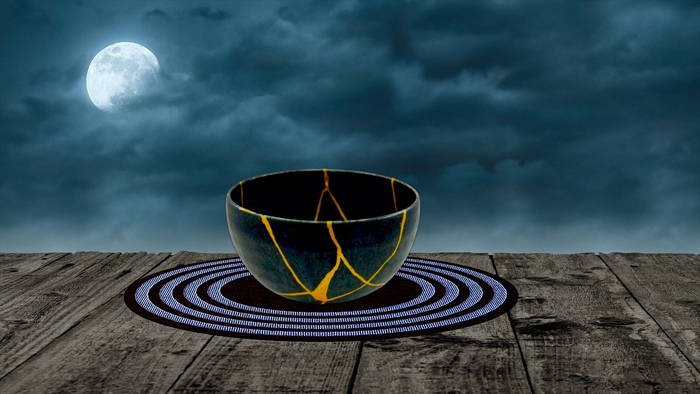
The wound is the place where the light enters you. ~Rumi
Japanese is a beautiful language with a wide range of words to describe feelings and abstract ideas that cannot be neatly expressed in a single English word.
I’ve talked about the concept of wabi sabi, which is a Japanese aesthetic of the beauty of things that are imperfect, impermanent, and incomplete. Wabi sabi can also refer to imperfect human beings. I’ve also written about ikigai, which draws together four areas of life: what you love, what you’re good at, what the world needs, and what you can be paid for, to create our sense of purpose.
I’m in awe of how the Japanese language can express in one word heartfelt philosophies, ideologies, and concepts, which might take paragraphs in English to fully represent.
Here are a couple more wonderful words that express some delightful aesthetics that might improve our lives:
Kintsugi: The Art of Golden Repair
Kintsugi is the Japanese art of repairing broken pottery by mending the damaged areas with gold, silver, or platinum adhesive that shows up in the repaired piece (see the above photo). Kintsugi treats breakage as a part of the history of anything instead of something to hide or avoid. Kintsugi can apply to people as well. We all have scars and uncomfortable parts, including failures, that we’d prefer to keep hidden.
Perhaps you’ve heard Rumi’s saying which encourages us to celebrate all the foibles that go into making us who we are. The Kintsugi philosophy encourages us to not disguise our scars and to open ourselves and be vulnerable and “let the light in.”
Shinrin-Yoku: Forest Bathing
This concept refers to being spiritually connected to nature. The average American spends only 7 percent of his or her life outdoors, and, as we age, the time spent outdoors decreases.
To perform Shinrin-Yoku find a spot In a wooded area like a park. The key to performing Shinrin-Yoku is to engage all five of your senses in nature by listening to the chirping birds, noticing the smell of the trees and bushes and flowers, touching the flora around you and even walking on the damp grass. The goal is just to be there and be aware of as much of it as possible. Let nature engulf you. Let it bathe you and elevate you physically, spiritually, and mentally. Do this on a regular basis. If you’re limited by a walker or a wheelchair, have someone assist you to roll on out; they could benefit by nature too!
Ma: Negative Space
The Japanese concept of Ma refers to nothingness or silence. The Japanese celebrate silence, whether alone or with others. We, on the other hand, often feel uncomfortable when the conversation lulls, and we feel the need to do something to fill the gap. Ma is a beautiful concept.
Incorporating the concept of Ma can improve our lives, for instance, through ‘think time,’ or what is similar to meditation. Sitting in silence and letting our minds just wander allows our brains to make space for new ideas and thoughts routinely crowded out by being so busy scrolling, Netflixing, or watching reruns. Try trading external stimuli for internal mental stimuli 30 minutes a day. Enjoy a slower and more peaceful pace.
Kaizen
Finally, this concept is very straightforward and simple. Kaizen means to focus on small improvements daily to become 1% better. Instead of setting a big goal, try dividing it into multiple small goals and tackle each of them one by one. Breaking down the tasks into smaller packets makes them easier to confront and thus, it’s more likely you’ll attempt them.
Do any of these words/concepts resonate with you? If you want to live better — which, of course, we all do — Japanese philosophy is worth a shot. Learn more about these concepts to live better and expand your well-being.

